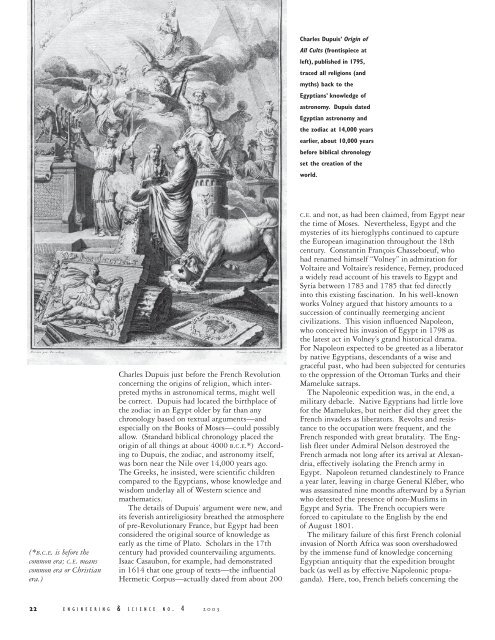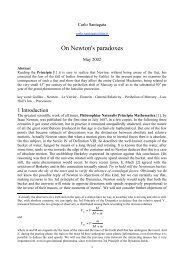Egyptian Stars under Paris Skies - Engineering & Science - Caltech
Egyptian Stars under Paris Skies - Engineering & Science - Caltech
Egyptian Stars under Paris Skies - Engineering & Science - Caltech
You also want an ePaper? Increase the reach of your titles
YUMPU automatically turns print PDFs into web optimized ePapers that Google loves.
Charles Dupuis’ Origin of<br />
All Cults (frontispiece at<br />
left), published in 1795,<br />
traced all religions (and<br />
myths) back to the<br />
<strong>Egyptian</strong>s’ knowledge of<br />
astronomy. Dupuis dated<br />
<strong>Egyptian</strong> astronomy and<br />
the zodiac at 14,000 years<br />
earlier, about 10,000 years<br />
before biblical chronology<br />
set the creation of the<br />
world.<br />
(*B.C.E. is before the<br />
common era; C.E. means<br />
common era or Christian<br />
era.)<br />
Charles Dupuis just before the French Revolution<br />
concerning the origins of religion, which interpreted<br />
myths in astronomical terms, might well<br />
be correct. Dupuis had located the birthplace of<br />
the zodiac in an Egypt older by far than any<br />
chronology based on textual arguments—and<br />
especially on the Books of Moses—could possibly<br />
allow. (Standard biblical chronology placed the<br />
origin of all things at about 4000 B.C.E.*) According<br />
to Dupuis, the zodiac, and astronomy itself,<br />
was born near the Nile over 14,000 years ago.<br />
The Greeks, he insisted, were scientific children<br />
compared to the <strong>Egyptian</strong>s, whose knowledge and<br />
wisdom <strong>under</strong>lay all of Western science and<br />
mathematics.<br />
The details of Dupuis’ argument were new, and<br />
its feverish antireligiosity breathed the atmosphere<br />
of pre-Revolutionary France, but Egypt had been<br />
considered the original source of knowledge as<br />
early as the time of Plato. Scholars in the 17th<br />
century had provided countervailing arguments.<br />
Isaac Casaubon, for example, had demonstrated<br />
in 1614 that one group of texts—the influential<br />
Hermetic Corpus—actually dated from about 200<br />
C.E. and not, as had been claimed, from Egypt near<br />
the time of Moses. Nevertheless, Egypt and the<br />
mysteries of its hieroglyphs continued to capture<br />
the European imagination throughout the 18th<br />
century. Constantin François Chasseboeuf, who<br />
had renamed himself “Volney” in admiration for<br />
Voltaire and Voltaire’s residence, Ferney, produced<br />
a widely read account of his travels to Egypt and<br />
Syria between 1783 and 1785 that fed directly<br />
into this existing fascination. In his well-known<br />
works Volney argued that history amounts to a<br />
succession of continually reemerging ancient<br />
civilizations. This vision influenced Napoleon,<br />
who conceived his invasion of Egypt in 1798 as<br />
the latest act in Volney’s grand historical drama.<br />
For Napoleon expected to be greeted as a liberator<br />
by native <strong>Egyptian</strong>s, descendants of a wise and<br />
graceful past, who had been subjected for centuries<br />
to the oppression of the Ottoman Turks and their<br />
Mameluke satraps.<br />
The Napoleonic expedition was, in the end, a<br />
military debacle. Native <strong>Egyptian</strong>s had little love<br />
for the Mamelukes, but neither did they greet the<br />
French invaders as liberators. Revolts and resistance<br />
to the occupation were frequent, and the<br />
French responded with great brutality. The English<br />
fleet <strong>under</strong> Admiral Nelson destroyed the<br />
French armada not long after its arrival at Alexandria,<br />
effectively isolating the French army in<br />
Egypt. Napoleon returned clandestinely to France<br />
a year later, leaving in charge General Kléber, who<br />
was assassinated nine months afterward by a Syrian<br />
who detested the presence of non-Muslims in<br />
Egypt and Syria. The French occupiers were<br />
forced to capitulate to the English by the end<br />
of August 1801.<br />
The military failure of this first French colonial<br />
invasion of North Africa was soon overshadowed<br />
by the immense fund of knowledge concerning<br />
<strong>Egyptian</strong> antiquity that the expedition brought<br />
back (as well as by effective Napoleonic propaganda).<br />
Here, too, French beliefs concerning the<br />
22 ENGINEERING & SCIENCE NO. 4 2003




